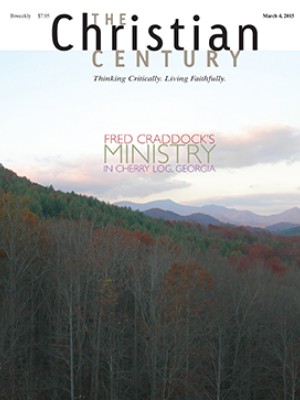Report reveals full history of theologian’s abuse, institutions’ response
A 73-page report in the most recent issue of the Mennonite Quarterly Review provides the first-ever comprehensive and detailed examination of theologian John Howard Yoder’s sexual abuse and the church’s response to it.
News of his transgressions first broke in 1992, but Rachel Waltner Goossen, a history professor at Washburn University in Topeka, Kansas, found that Yoder, who died in 1997, had been “methodically perpetrating sexual violence” against women since at least 1973. His offenses included suggestive comments and “physical coercion.” While the precise number of those abused is not known, it could exceed 100.
The Mennonite Church USA and Anabaptist Mennonite Biblical Seminary in Elkhart, Indiana, invited Goossen to do the research as an independent historian, though they did not provide funding.
Goossen conducted interviews with victims who received Yoder’s unwanted advances, Yoder’s colleagues, church administrators, and those involved in attempts to discipline him. She also had access to documents previously unavailable, notably church records in the MCUSA archive and the papers of Marlin Miller, who died in 1994. Miller served as president of Goshen Biblical Seminary, one of AMBS’s predecessor bodies. Those collections are now in the denominational archive in Goshen, Indiana, and open to researchers. Yoder’s personal papers are also in the archive, but the relevant files will remain sealed until 2047.
Read our latest issue or browse back issues.
Yoder’s method of operation was to invite women to assist in the exploration of a new Christian ethic of sex. With the sexual revolution and surging feminism of the 1960s and ’70s serving as a backdrop, Yoder started writing about sex and intimacy, particularly as it related to single people. Citing Jesus’ interactions with women, Yoder, who was married, said that “freedom of bodily affection and intimacy is not necessarily correlated with the satisfaction of genital drives.” Thus people not married to each other could engage in sexual relations as an expression of Christian intimacy without it being considered erotic or an act of adultery.
Many women refused Yoder’s invitations, and he claimed he always respected their decision. Others initially appreciated an esteemed professor’s “personal attentiveness,” “friendship,” and appeals to their intellect, according to Goossen.
“A generation later, professionals knowledgeable about sexual abuse would label his range of opportunistic approaches as ‘grooming’ behaviors,” she wrote.
Many of the women were GBS students, but at least two were from the nearby University of Notre Dame, where he also taught. Notre Dame declined to comment on Yoder, calling it a personnel matter and confidential.
Miller, a former student of Yoder’s at GBS, began hearing about his mentor’s extramarital sexual pursuits shortly after succeeding him as seminary president in 1975.
Miller later convened seminary groups to engage Yoder, first to discuss the theoretical aspects of his position and then to discipline him. Furthermore, Yoder believed that his work was so advanced that it was necessary to hide it from “those who could not help but misunderstand this liberty,” Goossen wrote, quoting Yoder. The secrecy also included the destruction of some documents by Miller and others at church offices, largely at Yoder’s request.
In addition, Yoder invoked Matthew 18 and demanded to confront his accusers, but none were willing to meet with him face to face. Yoder would later state that the inability to meet with them denied him the opportunity to apologize.
By mutual agreement between Yoder and the seminary, Yoder resigned in 1984. Yoder had continued his “experiments” in sexual ethics, despite Miller’s orders to cease, and claimed to be persecuted by Miller and those who had made accusations.
Yoder had joined the faculty at Notre Dame and asked Notre Dame administrators to “avoid giving the matter unnecessary prominence.”
Yoder served as president of the Society of Christian Ethics in 1987–88. Current SCE president William Schweiker said: “The SCE, as a scholarly society, is not in the position to make judgments about the lives of past or present members. At the same time, the SCE cannot and does not condone immoral and/or abusive actions, and as a society we work tirelessly to advance the dignity of our members and the responsibilities we bear as scholars of religion and ethics.”
Goossen rejected claims that the disciplinary process the Indiana-Michigan Conference of the Mennonite Church undertook, ending in 1996—which included suspending Yoder’s credentials in 1992 and urging therapy—was a successful case of restoration and reconciliation. Such claims, she wrote, “deflect attention from institutional complicity and reveal Yoder’s followers’ attempts to explain away his misdeeds so that they might reclaim his theology.”
Among those who had called for Yoder’s restoration was theologian Stanley Hauerwas. Earlier he had counseled Yoder to submit to the church’s discipline. After reading Goossen’s article, he was contrite.
“I was wrong,” Hauerwas said. “I just hadn’t realized the extent of John’s behavior.”
AMBS is planning a Service of Lament, Confession, and Hope and other events on campus March 21–22 “to acknowledge institutional responsibility for the harm inflicted” by Yoder and for “seminary leaders’ prolonged failure to intervene effectively.” MCUSA, the successor to the Mennonite Church of which Yoder was a lifelong member, is planning a similar observance during its convention this summer in Kansas City.
This article was edited on February 23, 2014, to clarify details about the interview subjects and the funding for the research.





